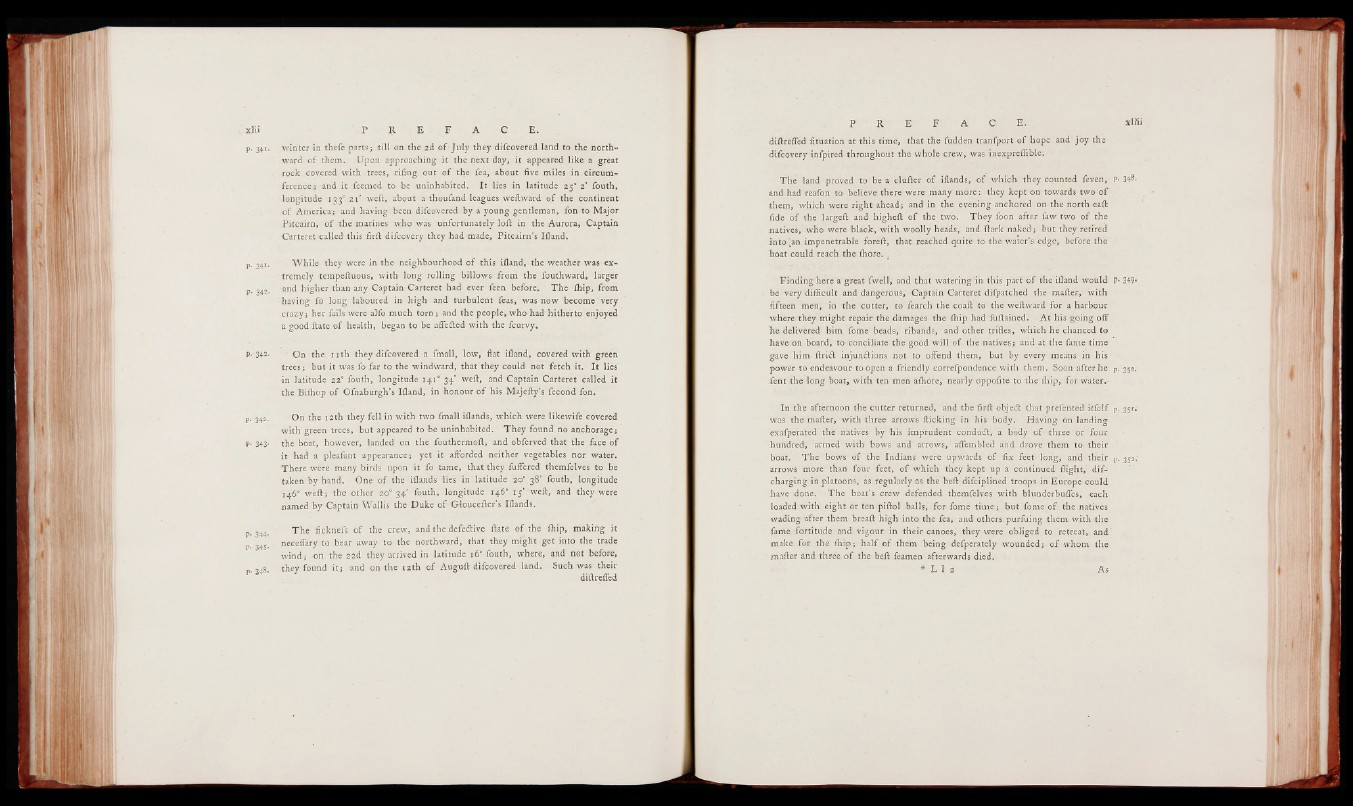
W X;lii
P- 341*
p. 34*•
P- 342.
P- 342.
P‘ 342.
P- 343-
P* 344-
P- 345-
p. 348.
winter in thefe parts; till on the 2d of July they difcovered land to the northward
of them. Upon approaching it the next day, it appeared like a great
rock covered with trees, riling out of the fea, about five miles in circumference.;
and it feemed to be uninhabited. It lies in latitude 250 2* fouth,
longitude 1330 21’ weft, about a thoufand leagues weft ward of the continent
of America; and having been difcovered by a young gentleman, fon to Major
Pitcairn, of the marines who was unfortunately loft in the Aurora, Captain
Carteret called this firft difcovery they had made, Pitcairn’s 111 and.
While they were in the neighbourhood of this iiland, the weather was extremely
tempeftuous, with long rolling billows from the fouthward, larger
and higher than any Captain Carteret had ever feen before. The ihip, from
having fo long laboured in high and turbulent feas, was now become very
crazy; her fails were alfo much torn; and the people, who had hitherto enjoyed
a good ftate of health, began to be affe&ed with the fcurvy.
On the 11 th they difcovered a fmall, low, flat iiland, covered with green
trees; but it was fo far to the windward, that they could not fetch it. It lies
in latitude 220 fouth, longitude 141° 34’ weft, and Captain Carteret called it
the Bifhop of Ofnaburgh’s Iiland, in honour of his Majefty’s fecond fon.
On the 12th they fell in with two fmall iflands, which were likewife covered
with green trees, but appeared to be uninhabited. They found no anchorage;
the boat, however, landed on the fouthermoft, and obferved that the face of
it had a pleafant appearance; yet it afforded neither vegetables nor water.
There were many birds upon it fo tame, that they fuffered themfelves to be
taken by hand. One of the iflands lies in latitude 20° 38’ fouth, longitude
146° weft; the other 20* 34’ fouth, longitude 146° 15’ weft, and they were
named by Captain Wallis the Duke of doucefter’s Iflands.
The ficknefs of the crew, and the defective ftate of the ihip, making it
neceflary to .bear away to the northward, that they might get into the trade
wind; on the 22d they arrived in latitude 160 fouth, where, and not before,
they found it; and on the 12th of Auguft difcovered land. Such was their
diftreifed
P R E F A C E.
diftreifed fituation at this time, that the fudden tranfport of hope and joy the
difcovery infpired throughout the whole crew, was inexpreffible.
The land proved to be a clufter of iflands, of which they counted feven,
and had reafon to believe,there were many more: they kept on towards two of
them, which were right ahead; and in the evening anchored on the north eaft
fide of the largeft and higheft of the two. They foon after faw two of the
natives, who were black, with woolly heads, and ftark naked; but they retired
into ^an impenetrable foreft, that reached quite to the water’s edge, before the
boat could reach the ihore. |
xliii
p. 348.
Finding here a great fwell, and that watering in this part of the iiland would 1
be very difficult and dangerous, Captain Carteret difpatched the mafter, with
fifteen men, in the cutter, to fearch the coaft to the weftward for a harbour
where they might repair the damages the ihip had fuftained. At his going off
he delivered him fome beads, ribands, and other trifles, which he chanced to
have on board, to conciliate the good will of the natives; and at the fame time
gave him ftridt injundtions not to offend them, but by every means in his
power to endeavour to open a friendly correfpondence with them. Soon after he j
fertt the long boat, with ten men afhore, nearly oppofite to the ihip, for water.-
In the afternoon the cutter returned, and the firft objeft that prefented itielf p. 351.'
was the mafter, with three arrows flicking in his body. Having on landing
exafperated the natives by his imprudent conduit, a body of three or four
hundred, armed with bows and arrows, aflembled and drove them to their
boat. The bows of the Indians were upwards of fix feet long, and their p. 352,’
arrows more than four feet, of which they kept up a continued flight, drf-
charging in platoons, as regularly as the beft difciplined troops in Europe could
have done. The boat’s crew defended themfelves with blunderbufles, each
loaded with eight or ten piftol balls, for fome time; but fome of the natives
wading ^fter them breaft high into the fea, and others purfuing them with the
fame fortitude and vigour in their canoes, they were obliged to retreat, and’
make for the ihip; half of them being defperately wounded; of whom the
mafter and three of the beft feamen afterwards died.
* L 1 2 As